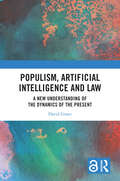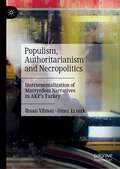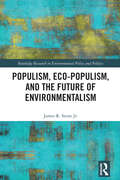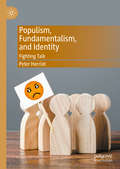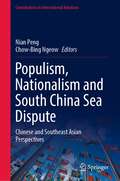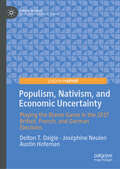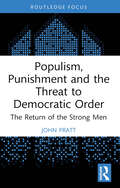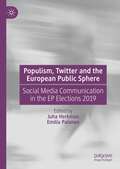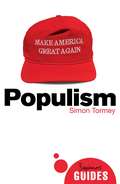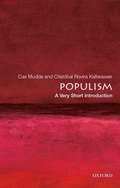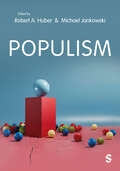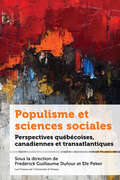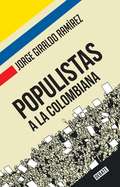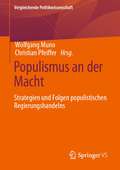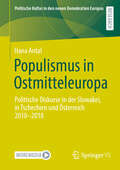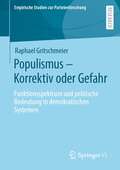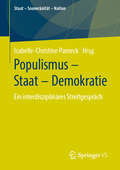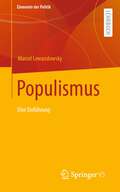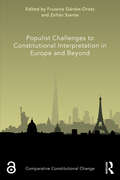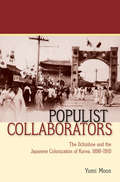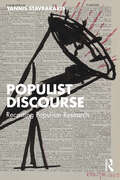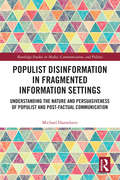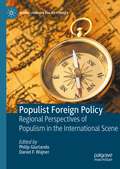- Table View
- List View
Populism, Artificial Intelligence and Law: A New Understanding of the Dynamics of the Present
by David GrantPolitical systems across much of the West are now subject to populist disruption, which often takes an anti-Constitutional form. This interdisciplinary book argues that the current analysis of anti-Constitutional populism, while often astute, is focused far too narrowly. It is held here that due to an obscured complex of dynamics that has shaped the history of the West since its inception and which remains active today, we do not understand the present. This complex not only explains the current disruptions across the fields of contemporary religion, politics, economics and emerging artificial intelligence but also how these disruptions derive each from originary sources. This work thereby explains not only the manner in which this complex has functioned across historical time but also why it is that its inherent, unresolvable flaws have triggered the shifts between these key fields as well as the intractability of these present disruptions. It is this flawed complex of factors that has led to current conflicts about abortion reform, political populism, the failure of neoliberalism and the imminent quantum shift in generative artificial intelligence. It is argued that in this, law is heavily implicated, especially at the constitutional level. Presenting a forensic examination of the root causes of all these disruptions, the study provides a toolbox of ideas with which to confront these challenges. This is a book of originality and significance, which will make fascinating reading for academics and researchers working in the areas of Socio-legal Studies, Legal Philosophy, Political Science, Theology, AI and Neuroscience.The Open Access version of this book, available at http://www.taylorfrancis.com, has been made available under a Creative Commons Attribution-Non Commercial-No Derivatives (CC-BY-NC-ND) 4.0 license.
Populism, Authoritarianism and Necropolitics: Instrumentalization of Martyrdom Narratives in AKP’s Turkey
by Ihsan Yilmaz Omer ErturkThis book examines how Turkey’s ruling party, the Justice and Development Party (AKP), under the leadership of Recep Tayyip Erdoğan produces and employs necropolitical narratives in order to perpetuate its authoritarian rule.In doing so, the book argues that as the party transitioned from socially conservative Muslim democratic values to authoritarian Islamism, it embraced a necropolitical narrative based on the promotion of martyrdom, and of killing and dying for the Turkish nation and Islam, as part of their authoritarian legitimation. This narrative, the book shows, is used by the party to legitimise its actions and deflect its failures through the framing of the deaths of Turkish soldiers and civilians, which have occurred due to the AKP’s political errors, as martyrdom events in which loyal servants of the Turkish Republic and God gave their lives in order to protect the nation in a time of great crisis. This book also describes how, throughout its second decade in power, the AKP has used Turkey’s education system, its Directorate of Religious Affairs, and television programs in order to propagate its necropolitical martyrdom narrative.
Populism, Eco-populism, and the Future of Environmentalism (Routledge Research in Environmental Policy and Politics)
by James R. Stone Jr.Populism, Eco-populism, and the Future of Environmentalism analyzes the history and language of populism in order to fully comprehend the threat of eco-fascism – paradoxically revealing that it is possible for there to be both progressive eco-Populist and right-wing sham eco-Populist discourses. The book highlights the harrowing prospect that the crises of democracy now confronting countries such as the United States may culminate in forms of eco-fascism in a world increasingly divided over issues of economic and social inequality, immigration, and competition for dwindling resources. The author reveals that there is a language of eco-populism that accompanies Populist and sham Populist discourses of the left and right as ecological crises have assumed a more prominent role in national and global politics. These crises are exacerbated by the willingness of the fossil fuel industry to destabilize democracy in order to forestall government-imposed limits on carbon emissions and elimination of fossil fuel subsidies that threaten their profits. The book, primarily a work of political and ecological theory, draws on the history of populism as well as the history of conservation and modern environmental movements to make an innovative argument – that a radical form of right-wing sham eco-populism that emerged out of the crucible of the energy crisis and recession of the 1970s has substantially contributed to the crises we now face. The author maintains that the only plausible solution to current political and ecological crises is a progressive eco-populism that combines environmental justice and sustainability with economic and social justice, and offers resources that can help construct a democratic and inclusive movement and culture. A progressive eco-Populist vision has led to proposals for a Green New Deal and the development of the Build Back Better Act currently being considered by the U.S. Congress, but the stalemate between progressive and conservative Democrats over the bill reveals both the compromised state of U.S. representative democracy and the need for a stronger movement to hold politicians and government accountable. This book will be of great interest to students, scholars, and researchers of environmental politics, environmental history, and environmental philosophy, as well as sociology, political science, and history.
Populism, Fundamentalism, and Identity: Fighting Talk
by Peter HerriotWhat can populism and fundamentalism possibly have in common? Peter Herriot argues that contrary to their apparent differences, these human phenomena are similar in two basic respects. First, they are both reactions against the complexities of the modern world in general, and its current crisis in particular. They propose instead a return to a mythical golden age, supposedly marked by purity and simplicity. Second, they both work in the same way psychologically. Using social identity theory, Herriot shows how both populism and fundamentalism create constant conflict by contrasting a virtuous ‘Us’ with a stereotypically evil ‘Them’. Contemporary case studies illustrate this process at work, and Herriot raises various issues as a basis for discussion, and concludes with hope.
Populism, Nationalism and South China Sea Dispute: Chinese and Southeast Asian Perspectives (Contributions to International Relations)
by Nian Peng Chow-Bing NgeowThis book analyzes two main trends of prevailing populism and nationalism in China and Southeast Asian nations and rising tensions in the South China Sea (SCS) by experts from China and Southeast Asia. The book involves the most recent developments and indicates future trends. This is the first book which goes deeply into the SCS dispute from the perspectives on populism and nationalism and thus highlighting their significance in Asian politics. The broad approach adopted in the book with focus on all important countries expands the scope of readership beyond specific academic community. The book interests academics, policy makers, journalists, general reader, and students of Asian politics. The main body of this book is divided into 8 parts, in which the first section briefly introduces the aims and scope of this book. The following 7 parts look at the new development of populism and nationalism in China and ASEAN claimant states and some important non-claimant states mainly including the Philippines, Vietnam, Malaysia, Indonesia, Singapore, Cambodia, and its multiple effects on the SCS dispute.
Populism, Nativism, and Economic Uncertainty: Playing the Blame Game in the 2017 British, French, and German Elections (Europe in Crisis)
by Delton T. Daigle Joséphine Neulen Austin HofemanThis project offers an in-depth look at the three 2017 elections held in Western Europe: France, Germany, and the UK. With events like Brexit and a general rise in right-wing populism across highly industrialized nations, understanding the underlying causes of increasingly extreme electoral behavior is both valuable and prescient. A highly theoretically-focused and current project, it provides a consistent methodological and analytic approach that uses election study data and primary sources to offer a complete and cogent picture of this complex phenomenon as can only found by examining the attitudes and behaviors of the most powerful of democratic participants: the voters.
Populism, Punishment and the Threat to Democratic Order: The Return of the Strong Men (Routledge Studies in Crime and Society)
by John PrattThis book traces the rise of contemporary populism in Western democracies, marked by the return of would-be 'strong men' politicians. It seeks to make sense of the resultant nature, origins, and consequences —as expressed, for example, in the startling rise of the social movement surrounding Trump in the US, Brexit in the UK and the remarkable spread of ideologies that express resistance to "facts," science, and expertise. Uniquely, the book shows how what began as a form of penal populism in the early 1990s transformed into a more wide ranging populist politics with the potential to undermine or even overthrow the democratic order altogether; examines the way in which the Covid-19 pandemic has impacted on these forces, arguing it threw the flailing democratic order an important lifeline, as Vladimir Putin has subsequently done with his war in Ukraine. The book argues that contemporary political populism can be seen as a wider manifestation of the earlier tropes and appeal of penal populism arising under neo-liberalism. The author traces this cross over and the roots of discontent, anxiety, anti-elites sentiment and the sense of being forgotten, that lie at the heart of populism, along with its effects in terms of climate denial, ‘fake news’, othering, nativism and the denigration of scientific and other forms of expertise. In a highly topical and important extension to the field the author suggests that the current covid pandemic might prove to be an ‘antidote’ to populism, providing the conditions in which scientific and medical expertise, truth telling, government intervention in the economy and in health policy, and social solidarity, are revalorised. Encompassing numerous subject areas and crossing many conventional disciplinary boundaries, this book will be of great interest to students and scholars of criminology and criminal justice, sociology, political science, law, and public policy.
Populism, Twitter and the European Public Sphere: Social Media Communication in the EP Elections 2019
by Juha Herkman Emilia PalonenThis volume approaches the relationship between European public sphere and political communication in the framework of establishing populism and social media. The empirical analysis focuses on the comparison between different EU countries during the 2019 EP elections campaign. The data for the analysis was collected real time from Twitter in the Netherlands, Germany, Finland, Italy, Spain, Ireland and the UK. during a month period and are analyzed with both computerized quantitative and manual qualitative methods.The book introduces a new perspective in conceptualizing populism in comparative analysis, in which populism is understood rather as an antagonist logic of political identity formation than pre-defined political ideologies, movements or party cleavages. We approach implications of populist construction of ‘us’ and ‘not us’ in national contexts of 2019 EP election campaigns to find out the relationality between different political actors and parties. A special attention is paid to national/transnational and European/Eurosceptic tendencies in campaign rhetoric. By using a unique idea of ‘hashtag publics’ we approach the common Twitter discussions around the elections and ask: what particular topics and themes did different political actors distribute over Twitter during the 2019 EP elections, how were various topics and actors linked to each other, and how were campaign agendas and actors linked to populism?Chapter-No.1,Chapter-No.4 and Chapter-No. 8 are available open access under a Creative Commons Attribution 4.0 International License via link.springer.com.
Populism: A Beginner's Guide (Beginner's Guides)
by Simon TormeyEvery day we hear that the rise of populism threatens democracy around the world, but is this really true? Did populism cause the current crisis, or is it the other way around? To understand the state of our politics right now, we must get to grips with this contested concept. Simon Tormey breaks down the defining aspects of populism, what sets it apart from other styles of politics, and what – if anything – we ought to do about it.
Populism: A Very Short Introduction (Very Short Introductions)
by Cristóbal Rovira Kaltwasser Cas MuddePopulism is a central concept in the current media debates about politics and elections. However, like most political buzzwords, the term often floats from one meaning to another, and both social scientists and journalists use it to denote diverse phenomena. What is populism really? Who are the populist leaders? And what is the relationship between populism and democracy? This book answers these questions in a simple and persuasive way, offering a swift guide to populism in theory and practice. <P><P> Cas Mudde and Crist bal Rovira Kaltwasser present populism as an ideology that divides society into two antagonistic camps, the "pure people" versus the "corrupt elite," and that privileges the general will of the people above all else. They illustrate the practical power of this ideology through a survey of representative populist movements of the modern era: European right-wing parties, left-wing presidents in Latin America, and the Tea Party movement in the United States. The authors delve into the ambivalent personalities of charismatic populist leaders such as Juan Domingo Peron, H. Ross Perot, Jean-Marie le Pen, Silvio Berlusconi, and Hugo Chavez. If the strong male leader embodies the mainstream form of populism, many resolute women, such as Eva Peron, Pauline Hanson, and Sarah Palin, have also succeeded in building a populist status, often by exploiting gendered notions of society. <P><P> Although populism is ultimately part of democracy, populist movements constitute an increasing challenge to democratic politics. Comparing political trends across different countries, this compelling book debates what the long-term consequences of this challenge could be, as it turns the spotlight on the bewildering effect of populism on today's political and social life.
Populism: An Introduction
by Michael Jankowski Robert A. HuberAfter reading this groundbreaking textbook, you will have a solid understanding of state-of-the-art populism research and be ready to take a deep dive into more complex debates. Every chapter follows a clear and logical structure and employs the following learning features to help you grapple with the complex topic of Populism: • Introduces the most state-of-the-art theories, methods, and empirical findings in populism research. • Examples from populism in different regions of the world to illustrate the variation within populism studies around the globe. • Learn by doing: ‘hands on’ exercises and the ‘measuring populism’ chapters encourage students to play with data and start researching populism independently. • Chapters on hot topics in populism, such as populism, media and political communication, and the impact of populist parties in government. • Various didactical features will allow you to trace your progress and guide you through the text-book. Our expert authors will guide you through each chapter with carefully selected examples from diverse contexts, illustrating the multifaceted nature of populism. Looking at examples from around the world will help you to understand how populism shows up in different political settings. It will give you an introduction to the topic that allows you to command the field of empirical populism research. Robert A. Huber is Professor of Political Science Research Methods at the University of Salzburg. Michael Jankowski is Team Lead for the Data Science group in the Federal German Chancellery. He is also affiliated with the University of Oldenburg.
Populism: An Introduction
by Michael Jankowski Robert A. HuberAfter reading this groundbreaking textbook, you will have a solid understanding of state-of-the-art populism research and be ready to take a deep dive into more complex debates. Every chapter follows a clear and logical structure and employs the following learning features to help you grapple with the complex topic of Populism: • Introduces the most state-of-the-art theories, methods, and empirical findings in populism research. • Examples from populism in different regions of the world to illustrate the variation within populism studies around the globe. • Learn by doing: ‘hands on’ exercises and the ‘measuring populism’ chapters encourage students to play with data and start researching populism independently. • Chapters on hot topics in populism, such as populism, media and political communication, and the impact of populist parties in government. • Various didactical features will allow you to trace your progress and guide you through the text-book. Our expert authors will guide you through each chapter with carefully selected examples from diverse contexts, illustrating the multifaceted nature of populism. Looking at examples from around the world will help you to understand how populism shows up in different political settings. It will give you an introduction to the topic that allows you to command the field of empirical populism research. Robert A. Huber is Professor of Political Science Research Methods at the University of Salzburg. Michael Jankowski is Team Lead for the Data Science group in the Federal German Chancellery. He is also affiliated with the University of Oldenburg.
Populism: Performance, Political Style, And Representation (Key Concepts in Political Theory)
by Benjamin MoffittPopulism is the key political phenomenon of the 21st century. From Trump to Brexit, from Chávez to Podemos, the term has been used to describe leaders, parties and movements across the globe who disrupt the status quo and speak in the name of ‘the people’ against ‘the elite’. Yet the term remains something of a puzzle: poorly understood, vaguely defined and, more often than not, used as a term of abuse. In this concise and engaging book, leading expert Benjamin Moffitt cuts through this confusion. Offering the first accessible introduction to populism as a core concept in political theory, he maps the different schools of thought on how to understand populism and explores how populism relates to some of the most important concepts at the heart of political debate today. He asks: what has populism got to do with nationalism and nativism? How does it intersect with socialism? Is it compatible with liberalism? And in the end, is populism a good or bad thing for democracy? This book is essential reading for anyone – from students and scholars to general readers alike – seeking to make sense of one the most important and controversial issues in the contemporary political landscape.
Populisme et sciences sociales: Perspectives québécoises, canadiennes et transatlantiques (Politique et politiques publiques)
by Elke Winter Victor Armony Emily Laxer Geneviève Tellier Olivier Audet Olivier Bélanger-Duchesneau Olivier Bérubé-Sasseville Joanie Bouchard Stéphanie Chouinard Sylvain Crépon Allison Harell Isabel L. Krakoff Mathieu Lizotte Djamila Mones Sébastien Mosbah-Natanson Anke Patzelt Derek J. Robey François Tanguay Annie VerreaultLe populisme n’a jamais été aussi populaire en tant que concept, tant dans les débats académiques que publics. Il est une des réalités politiques, en particulier dans sa variété de droite, qui a suscité à la fois la plus grande surprise par son ampleur et le plus de questionnements sur sa nature depuis le Brexit et l’élection présidentielle de Donald Trump en 2016. Au Canada, l’actualité politique depuis la COVID-19 semble donner raison à la thèse voulant que ce pays ne soit pas une exception à la vague populiste globale. Dans ce nouveau contexte politique, il devient crucial d’approfondir notre compréhension du populisme à l'aide des outils analytiques des sciences sociales, ce que propose ce volume édité. Populisme et sciences sociales offre des contributions théoriques, empiriques et multidisciplinaires à l’étude de l'un des phénomènes les plus marquants du XXIe siècle.
Populismo en Colombia
by Jorge Giraldo RamirezUn completo estudio sobre el populismo en Colombia y sus consecuencias. <P><P>El populismo reverdece en el mundo. Crece allí donde las instituciones democráticas y liberales fallan. Se nutre del inconformismo y se extiende como una incitación a salidas desesperadas. <P> Pero, a pesar de ser un término de uso frecuente la noción misma de populismo se ha oscurecido en manos de la especulación, la falta de contexto histórico y la ausencia de estudios locales. <P>Populistas a la colombiana busca llenar ese vacío en momentos en que el país, en medio de la contienda electoral que sigue a los acuerdos de La Habana, asiste a la recomposición de su mapa político y el surgimiento de nuevos líderes. <P>En conjunto, el libro reconstruye el origen y sentidos del populismo, sus versiones regionales, los contradictores que han colaborado en su definición y describe las formas que adoptó en Colombia, en tres casos significativos: Jorge Eliécer Gaitán, Gustavo Rojas Pinilla y Álvaro Uribe, y otros menos representativos, como Gustavo Petro. <P> De cierre, Jorge Giraldo Ramírez reflexiona, muy a propósito de la actual coyuntura, sobre la probabilidad de otro otro populismo en Colombia.
Populismus an der Macht: Strategien und Folgen populistischen Regierungshandelns (Vergleichende Politikwissenschaft)
by Wolfgang Muno Christian PfeifferPopulisten wie Donald Trump, Viktor Orbán oder Jair Bolsonaro verändern die Weltpolitik und stellen etablierte institutionelle Verfahrensweisen in Frage. Der Sammelband betrachtet die Regierungsführung populistischer Akteure und gibt einen Einblick in politische Strategien und Folgen des Handelns von Populisten an der Macht. Die leitende Fragestellung ist, wie es Populismus mit der Demokratie hält: Wirkt er sich ausschließlich negativ auf die Qualität einer Demokratie aus oder gibt es auch Anzeichen einer positiven Wirkung von Populismus im Sinne eines Korrektivs vermeintlicher Fehlentwicklungen? Wann hört populistisches Regieren auf und wann fängt autokratisches Regieren an? Die Substanz von Populismus zeigt sich letztlich an der Macht.Der vorliegende Sammelband verfolgt das Ziel, sich dieser Demokratiefrage empirisch zu nähern. Neben quantitativ-vergleichenden Beiträgen zu Auswirkungen auf die Demokratiequalität und zu anti-muslimischen Einstellungen werden populistische Mechanismen und Praktiken in Ländern wie Indien, den USA, Venezuela, Argentinien, Brasilien, Österreich, Spanien, Polen, Ungarn, Bulgarien, Rumänien sowie Österreich analysiert. Das Interesse liegt insbesondere auf der Entwicklung der Regime- bzw. Demokratiequalität und der Variation von Art und Wirkung populistischer Herrschaft in unterschiedlichen Kontexten und verschiedenen Weltregionen.
Populismus in Ostmitteleuropa: Politische Diskurse in der Slowakei, in Tschechien und Österreich 2010–2018 (Politische Kultur in den neuen Demokratien Europas)
by Hana AntalDer in Europa erstarkende Populismus steht seit Jahren im Fokus wissenschaftlicher Debatten. Im Unterschied zum westeuropäischen Rechtspopulismus wird dem Populismus aus Ostmitteleuropa wenig Aufmerksamkeit geschenkt, und komparative Studien werden selten durchgeführt. Dieses Buch befasst sich mit den Gemeinsamkeiten und Unterschieden in den Inhalten, Funktionslogiken und Ausbreitung der Populismen in der Slowakei, in Tschechien und Österreich. Populisten in den drei historisch verflochtenen Nachbarländern ähneln sich in ihrer Rhetorik – sie sind jedoch nicht alle als Rechtspopulisten zu klassifizieren und einander gleichzusetzen. Diese vergleichende Studie untersucht die Populismen anhand der Diskurse über die Flüchtlingskrise, die Eurokrise, Ausländer und Minderheiten zwischen 2010 und 2018. Die Autorin zeigt darin auf, inwiefern sich die Populismen in den postsozialistischen Ländern durch spezifische Merkmale von den „westlichen“ Varianten, d. h. von Populismen in Ländern ohne staatssozialistische Vergangenheit, unterscheiden. Populismus wird als ein Phänomen vorgestellt, das zwar allgemeingültige Merkmale aufweist, aber gleichzeitig stark kontextgebunden ist. Dabei wird deutlich, wie sich die jeweils unterschiedlichen historischen Entwicklungspfade und die damit einhergehenden Merkmale der politischen Parteiensysteme und Kulturen in den Ausprägungen des Populismus in den drei Ländern manifestieren.
Populismus – Korrektiv oder Gefahr: Funktionsspektrum und politische Bedeutung in demokratischen Systemen (Empirische Studien zur Parteienforschung)
by Raphael GritschmeierIn der öffentlichen Diskussion stellt Populismus vor allem im europäischen Raum einen negativ konnotierten Begriff dar. Meist werden populistische Parteien als Gefahr für die liberale Demokratie, ihre Institutionen und Garantien betrachtet. Die Forschung schreibt ihnen jedoch bereits seit längerem eine potenzielle Wirkung als Korrektiv zu. Diese Ausgangslage nimmt die vorliegende Studie zum Anlass, die beiden Wirkperspektiven (Korrektiv/Gefahr) zu systematisieren und mithilfe von jeweils vier zugehörigen Funktionen auszudifferenzieren. Dieses theoretisch ausbuchstabierte Funktionstableau wird anhand der rechtspopulistischen Fallbeispiele Alternative für Deutschland (AfD) und Freiheitliche Partei Österreichs (FPÖ) empirisch geprüft. Ausgehend von der hohen Kontextaffinität von (Rechts-)Populismus steht die Frage im Mittelpunkt, welche Funktionen (rechts-)populistische Akteure innerhalb der liberal-demokratischen Ordnung übernehmen und unter welchen Kontextbedingungen sie diese aus- und erfüllen können.
Populismus – Staat – Demokratie: Ein interdisziplinäres Streitgespräch (Staat – Souveränität – Nation)
by Isabelle-Christine PanreckZwar fällt die Populismusforschung auf den ersten Blick ins Kerngebiet der Politikwissenschaft, aber keine Geistes- oder Sozialwissenschaft verschließt sich der Debatte. Dabei erfolgt eine interdisziplinäre Verknüpfung der einzelnen Diskussionsfäden bislang nur vereinzelt. Der Sammelband stößt in die Lücke, indem er erstmals Vertreterinnen und Vertreter der Kunst-geschichte, Ökonomie, Philosophie, Politikwissenschaft, Politolinguistik, Städtebau/Architektur und Theologie zum Streitgespräch versammelt.
Populismus: Eine Einführung (Elemente der Politik)
by Marcel LewandowskyDas Lehrbuch bietet eine einführende Darstellung des Populismus in allen relevanten Facetten. Namentlich adressiert das Buch seine unterschiedlichen Manifestationen (als Ideologie, Parteiprogramm und individuelle Einstellung), stellt den Populismus in vergleichender Perspektive vor und analysiert die Ursachen für den Wahlerfolg populistischer Parteien. Ferner diskutiert das Buch die Auswirkungen populistischer Parteien auf die Demokratie und den Parteienwettbewerb.
Populist Challenges to Constitutional Interpretation in Europe and Beyond (Comparative Constitutional Change)
by Zoltán Szente Fruzsina Gárdos-OroszThis book explores the relationship between populism or populist regimes and constitutional interpretation used in those regimes. The volume discusses the question of whether contemporary populist governments and movements have developed, or encouraged new and specific constitutional theories, doctrines and methods of interpretation, or whether their constitutional and other high courts continue to use the old, traditional interpretative tools in constitutional adjudication. The book is divided into four parts. Part I contains three chapters elaborating the theoretical basis for the discussion. Part II examines the topic from a comparative perspective, representing those European countries where populism is most prevalent, including Austria, Croatia, the Czech Republic, Greece, Hungary, Italy, Poland, Romania, Spain, and the United Kingdom. Part III extends the focus to the United States, reflecting how American jurisprudence and academia have produced the most important contributions to the theory of constitutional interpretation, and how recent political developments in that country might challenge the traditional understanding of judicial review. This section also includes a general overview on Latin America, where there are also some populist governments and strong populist movements. Finally, the editors’ closing study analyses the outcomes of the comparative research, summarizing the conclusions of the book. Written by renowned national constitutional scholars, the book will be essential reading for students, academics and researchers working in Constitutional Law and Politics.
Populist Collaborators: The Ilchinhoe and the Japanese Colonization of Korea, 1896–1910
by Yumi MoonAn empire invites local collaborators in the making and sustenance of its colonies. Between 1896 and 1910, Japan's project to colonize Korea was deeply intertwined with the movements of reform-minded Koreans to solve the crisis of the Choson dynasty (1392-1910). Among those reformers, it was the Ilchinhoe (Advance in Unity Society)-a unique group of reformers from various social origins-that most ardently embraced Japan's discourse of "civilizing Korea" and saw Japan's colonization as an opportunity to advance its own "populist agendas." The Ilchinhoe members called themselves "representatives of the people" and mobilized vibrant popular movements that claimed to protect the people's freedom, property, and lives. Neither modernist nor traditionalist, they were willing to sacrifice the sovereignty of the Korean monarchy if that would ensure the rights and equality of the people.Both the Japanese colonizers and the Korean elites disliked the Ilchinhoe for its aggressive activism, which sought to control local tax administration and reverse the existing power relations between the people and government officials. Ultimately, the Ilchinhoe members faced visceral moral condemnation from their fellow Koreans when their language and actions resulted in nothing but assist the emergence of the Japanese colonial empire in Korea. In Populist Collaborators, Yumi Moon examines the vexed position of these Korean reformers in the final years of the Choson dynasty, and highlights the global significance of their case for revisiting the politics of local collaboration in the history of a colonial empire.
Populist Discourse: Recasting Populism Research
by Yannis StavrakakisPopulist Discourse: Recasting Populism Research offers a refreshingly innovative discourse theory perspective on populist phenomena. Reading this book will help you familiarize yourself with the historical genealogy of significant populist phenomena from the end of the 19th century onwards and with the main conceptual/theoretical accounts established to analyse them. Mainstream conceptualizations of populism in both academia and public discourse are critically discussed in order to map new, promising avenues for research. Inspired by the works of Ernesto Laclau and Chantal Mouffe, the book addresses current challenges within populism research and highlights the new directions that a conceptually nuanced, theoretically rigorous and historically informed discursive orientation can contribute to the contemporary study of populism. Without sacrificing attention to detail, strong bibliographical support and a focus on the future development of populism research, Populist Discourse is written in accessible language to engage populism scholars, advanced undergraduates and graduate-level students within the field of political science. Due to its interdisciplinary character, it will also appeal to readers associated with various politically informed area studies and the broader field of ideology and discourse analysis.
Populist Disinformation in Fragmented Information Settings: Understanding the Nature and Persuasiveness of Populist and Post-factual Communication (Routledge Studies in Media, Communication, and Politics)
by Michael HameleersIn this highly relevant work, Dr. Michael Hameleers illuminates the role of traditional and social media in shaping the political consequences of populism and disinformation in a mediatized era characterized by post-factual relativism and the perseverance of a populist zeitgeist. Using comparative empirical evidence collected in the US, the UK, and the Netherlands, this book explores the politics and discursive construction of populism and disinformation, how they co-occur, their effects on society, and the antidotes used to combat the consequences of these communicative phenomena. This book is an essential text for students and academics in communication, media studies, political science, sociology, and psychology.
Populist Foreign Policy: Regional Perspectives of Populism in the International Scene (Global Foreign Policy Studies)
by Philip Giurlando Daniel F. WajnerThis book explores the global phenomenon of populism in relation to states' foreign policy, addressing two key questions: How do populists mold their foreign policies? What are the domestic and external factors that enable and constrain it? To this end, the book brings together a diverse group of scholars who have already researched on populist foreign policies (PFP) in specific countries to contribute shared chapters that examine their drivers, patterns, and effects according to distinctive regions: North America, Western Europe, Southern Europe, Central-Eastern Europe, Latin America, South-East Asia, the Middle East, Oceania, and Africa. The empirical analysis sheds new light on how populists’ distinctive conception of a world divided antagonistically between “the people” and “the elites” influences behaviour towards multilateral organizations such as the United Nations and the European Union, and regional or global hegemonic powers like the United States, Germany, Russia, and China. The book also shows how ideas related to identity, ideology, status and emotions, impinge on populists’ conduct vis-à-vis other international actors, and how national and international structures affect the implementation of populist foreign policies in the regional, interregional, and global arenas. The wide geographical diversity and regional representation are also valuable in identifying cultural similarities and differences. Hence, the findings contribute to lively debates on whether there is a unified and coherent foreign policy among populist leaderships, and whether populism leads to a gradual “corrective” of transnational trends in contemporary politics or, conversely, to a more radical, structural shift in the liberal international order.
